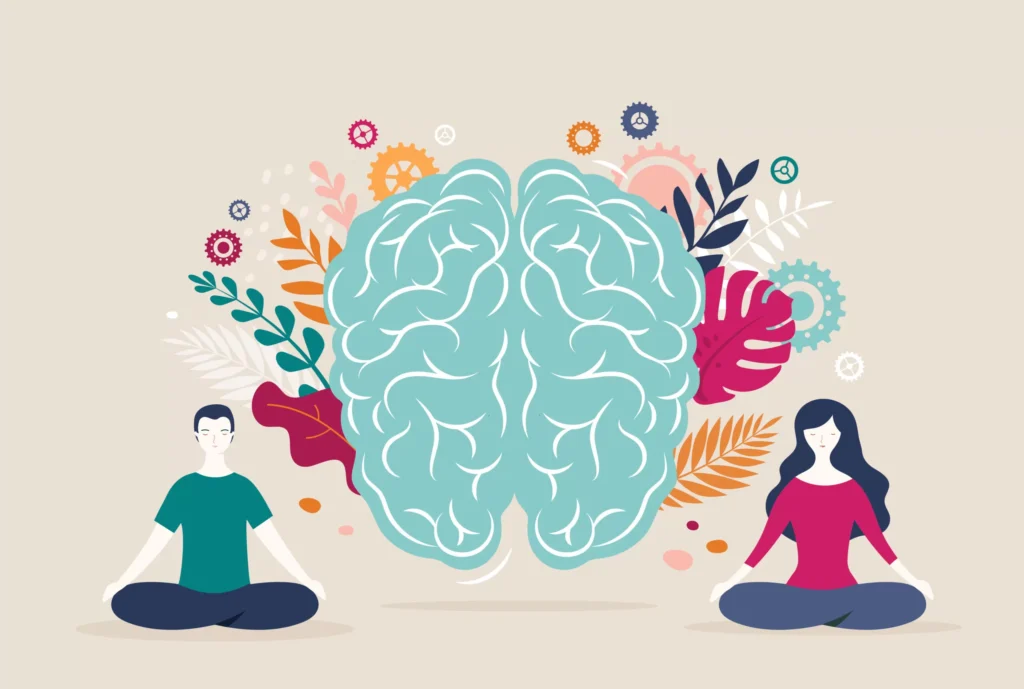
Meditation is more than a trendy practice—it’s a scientifically validated method to enhance brain health and overall well-being. In a world where stress, anxiety, and cognitive decline can hinder daily life and performance, meditation offers a natural solution. In this article, we delve into how meditation reprograms your brain, reduces stress levels, and increases mindfulness, providing simple yet powerful steps to improve mental clarity and long-term health. By combining modern research with practical techniques, this guide empowers you to take control of your neurological wellness.
Understanding Meditation’s Link to Brain Health
Meditation is more than just a relaxation technique—it is a transformative practice that reshapes the brain’s structure and functionality. Numerous studies highlight that regular meditation encourages neuroplasticity, which is the brain’s remarkable ability to adapt and reorganize in response to new experiences. This quality is essential for improving memory, sharpening attention, and enhancing emotional regulation.
Key mechanisms behind meditation’s benefits include reduced stress hormone levels and increased connectivity in regions associated with self-awareness. Even short daily sessions can drive significant changes, proving meditation as an invaluable tool for maintaining mental health. The neurobiological benefits of meditation continue to be a cornerstone topic in psychological research.
Additionally, meditation offers a holistic strategy for managing mental challenges—it helps focus the mind and break the cycle of negative, ruminative thinking. This not only rewires brain patterns but also cultivates a more resilient and positive mindset. As you read through this guide, you’ll discover practical insights to harness the full spectrum of meditation’s brain-boosting benefits.
Scientific Evidence Supporting Meditation

Over the past decades, extensive research has validated meditation’s positive impact on brain health. Empirical evidence shows that meditation triggers changes in brain regions associated with attention, emotional balance, and stress management. This scientific backing reinforces the claim that meditation serves as a non-pharmaceutical intervention to boost cognitive performance and overall well-being.
For instance, neuroimaging studies reveal that regular meditators often exhibit thicker prefrontal cortices—an area crucial for executive functions—and other brain zones related to memory and decision-making. This supports the notion that consistent meditation can slow age-related cognitive decline. The growing scientific consensus positions meditation as a key component in mental health therapies.
Furthermore, research has shown that those who meditate regularly benefit from lower cortisol levels and enhanced stress resilience, which play an important role in preventing cognitive impairment. Trusted institutions like the National Center for Complementary and Integrative Health provide in-depth summaries of these findings.
Practical Meditation Techniques for Everyday Practice
Incorporating meditation into your daily routine is simpler than you might think. Techniques such as mindful breathing or a short session of guided meditation can provide immediate mental benefits. Beginners are encouraged to start with just a few minutes a day, gradually increasing the time as they grow more comfortable.
Mindfulness meditation, in particular, is an accessible technique that helps you stay present by observing your thoughts without judgment. The simplicity of this practice makes it a perfect choice for busy individuals seeking quick, effective stress relief.
Another highly effective method is loving-kindness meditation, which cultivates compassion for yourself and others. Regular practice of this technique can enhance emotional resilience and foster a more optimistic outlook. For those looking for guidance, many online resources and mobile apps offer structured meditation sessions.

Long-Term Benefits and How to Maintain Them
A regular meditation practice yields long-term benefits that extend well beyond immediate stress relief. Over time, you can experience enhanced memory, improved concentration, and better emotional regulation. Gradually, the brain becomes more adept at managing stress, resulting in a balanced and resilient state of mind.
Maintaining these benefits starts with establishing a consistent routine. Whether you choose to meditate at dawn or just before bed, setting aside that time every day is crucial. Experts suggest beginning with short sessions and gradually increasing their duration as meditation becomes a natural part of your daily life.
Integrating lifestyle changes such as a balanced diet and regular physical activity can further amplify the cognitive benefits of meditation. Embracing these holistic habits helps nurture both body and mind, ensuring the long-term advantages of your meditation practice continue to grow.
Meditation in the Modern Psychological Context
In today’s fast-paced world, meditation provides an effective remedy for many psychological challenges. It has been integrated into various therapeutic practices and is often recommended as an adjunct treatment for depression, anxiety, and even post-traumatic stress disorder. The modern approach in psychology now embraces meditation as a versatile technique that nurtures both mental and physical well-being.
Many psychologists advocate for meditation not only as a means to alleviate symptoms but also as a way to build overall mental resilience. This evolving perspective underscores the importance of accessible, non-invasive interventions in mental health. Incorporating meditation into cognitive behavioral therapies further highlights its role in holistic healing.

Beyond therapeutic settings, the adoption of meditation in educational institutions and corporate environments showcases its broad appeal. By promoting mindfulness and reducing stress, meditation is transforming how organizations enhance employee well-being and productivity. Its widespread acceptance marks a pivotal moment in modern psychological practice.
Contenit Additional
To fully appreciate the profound impact of meditation on brain health, it’s important to adopt a multifaceted approach to mental wellness. Psychology research reveals that chronic stress is a leading factor in cognitive decline. By managing stress with meditation, you can experience enhanced clarity, improved concentration, and better overall cognitive performance. Meditation not only soothes the mind but also supports neurogenesis—the creation of new neural cells—essential for sustaining brain vitality as we age.
Another key aspect of meditation is its ability to boost emotional intelligence. Through regular practice, you develop the capacity to observe your thoughts and emotions without reacting impulsively. This heightened awareness helps identify stress triggers and manage feelings such as anger or sadness, ultimately improving personal relationships and professional interactions.

Meditation also encourages mindfulness—a state of active, open attention focused on the present. Recognized for its positive impact on decision-making and creativity, mindfulness allows you to feel more grounded and better equipped to handle modern life’s complexities. Through a mindful approach, you unlock deeper self-knowledge and mental resilience.
Finally, the cumulative benefits of regular meditation include better sleep quality, improved emotional regulation, and enhanced stress management. With a growing body of scientific evidence supporting these effects, meditation is increasingly becoming a cornerstone in psychological well-being. Whether you are new to meditation or a seasoned practitioner, incorporating it into your daily life can transform your mental landscape, one mindful breath at a time.
Finally, the cumulative benefits of regular meditation include better sleep quality, improved emotional regulation, and enhanced stress management. With a growing body of scientific evidence supporting these effects, meditation is increasingly becoming a cornerstone in psychological well-being. Whether you are new to meditation or a seasoned practitioner, incorporating it into your daily life can transform your mental landscape, one mindful breath at a time.
In conclusion, meditation holds remarkable potential to enhance cognitive function, reduce stress, and boost overall brain health. A consistent meditation practice not only enhances self-awareness but also fosters long-term psychological resilience. As modern research continues to reveal its positive effects, integrating meditation into your routine is a natural step toward achieving a balanced, healthier mind. Whether your goal is stress relief or cognitive enhancement, adopting these practices can bring transformative, lasting benefits. Remember, your brain is dynamic, and with persistence, the simple steps in this article can revolutionize your mental well-being.




